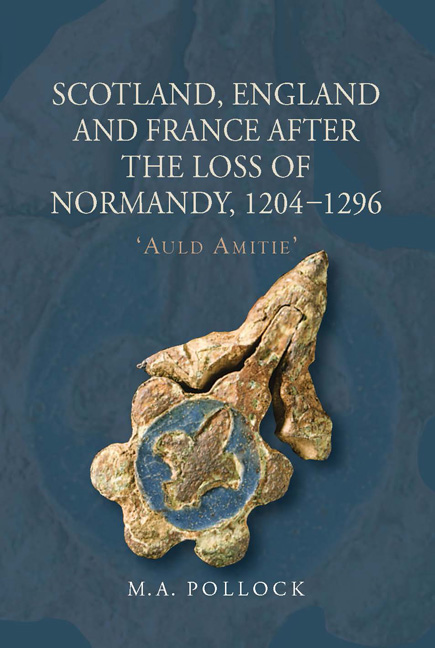Book contents
- Frontmatter
- Dedication
- Contents
- List of Genealogical Tables
- Acknowledgements
- List of Abbreviations
- Introduction
- 1 King John and Scotland after the Loss of Normandy
- 2 The Scots and the First Barons' War
- 3 Alexander and Henry III
- 4 War and Marriage: The French Dimension
- 5 The ‘Auld Alliance’: A New Beginning
- Conclusion
- Bibliography
- Index
Introduction
Published online by Cambridge University Press: 05 May 2015
- Frontmatter
- Dedication
- Contents
- List of Genealogical Tables
- Acknowledgements
- List of Abbreviations
- Introduction
- 1 King John and Scotland after the Loss of Normandy
- 2 The Scots and the First Barons' War
- 3 Alexander and Henry III
- 4 War and Marriage: The French Dimension
- 5 The ‘Auld Alliance’: A New Beginning
- Conclusion
- Bibliography
- Index
Summary
When King John of England departed from Normandy on 5 December 1203, he ruled over an aristocracy whose origins were deeply rooted in traditions and customs on both sides of the Channel. His failure to return to Normandy by mid-1204 shook the foundations of this social structure and left men and women who held lands in England and in Normandy vulnerable to the invading forces of Philip Augustus of France. Entrusted with strategically significant Norman fortresses, they had no recourse but to relinquish the king's position and return to England. Subsequently, a large section of the Anglo-French nobility was disinherited of its Norman fees.
The effect of John's withdrawal from the Continent was profound and for many families, including some in Scotland, imposed a position irreconcilable with the former political structure of their cross-Channel estates. The majority of the English nobility who had held land in France forfeited of their continental holdings because of King John's failure to retain the loyalty of men in key positions in Normandy. Men like Guillaume des Roches, seneschal of Anjou and Maine, Guérin de Glapion, Ralph Tesson, William du Hommet constable of Normandy, Hugh de Gournai, Robert, count of Sées, Amaury, count of Evreux, and Amaury, viscount of Thouars, and his brother, Guy of Thouars, count of Brittany, all abandoned the king. Some of these men defected specifically because of King John's treatment of his nephew, Arthur of Brittany, which was to remain an issue for John until the end of his life. William de Briouze, who had been in charge of Arthur after his capture in 1202, leaked the king's involvement in the murder of Arthur when the king attacked him and others for failing to pay their debts to the crown. John's actions unified against him a number of men who did not trust a man who could kill his own nephew and who flouted the principles of lordship.
- Type
- Chapter
- Information
- Scotland, England and France after the Loss of Normandy, 1204–1296'Auld Amitie', pp. 1 - 7Publisher: Boydell & BrewerPrint publication year: 2015

